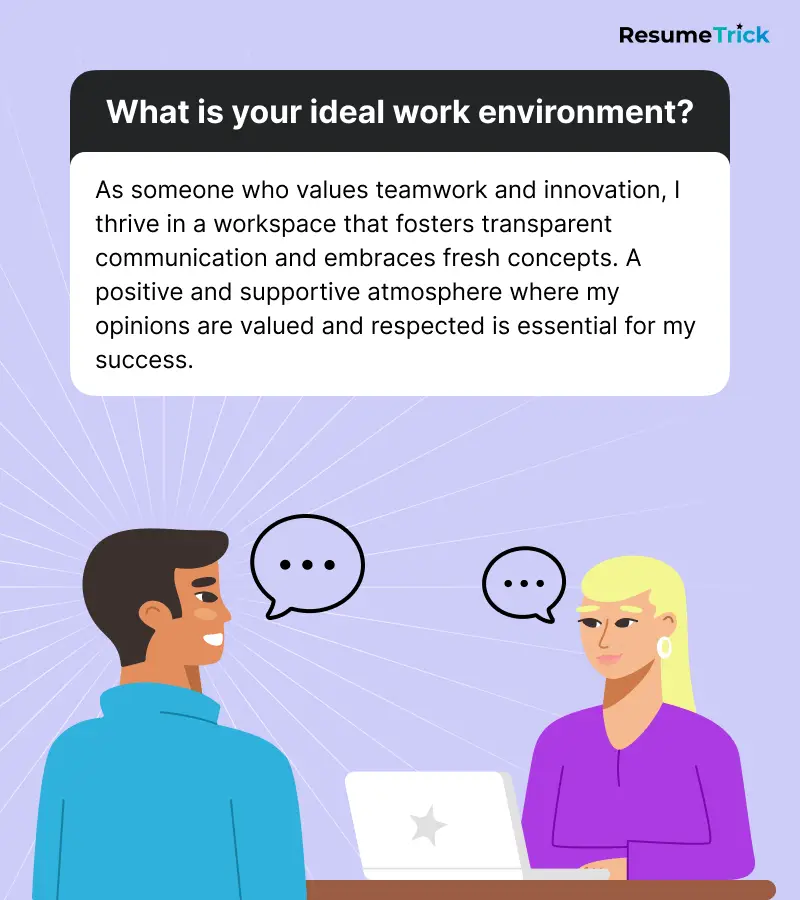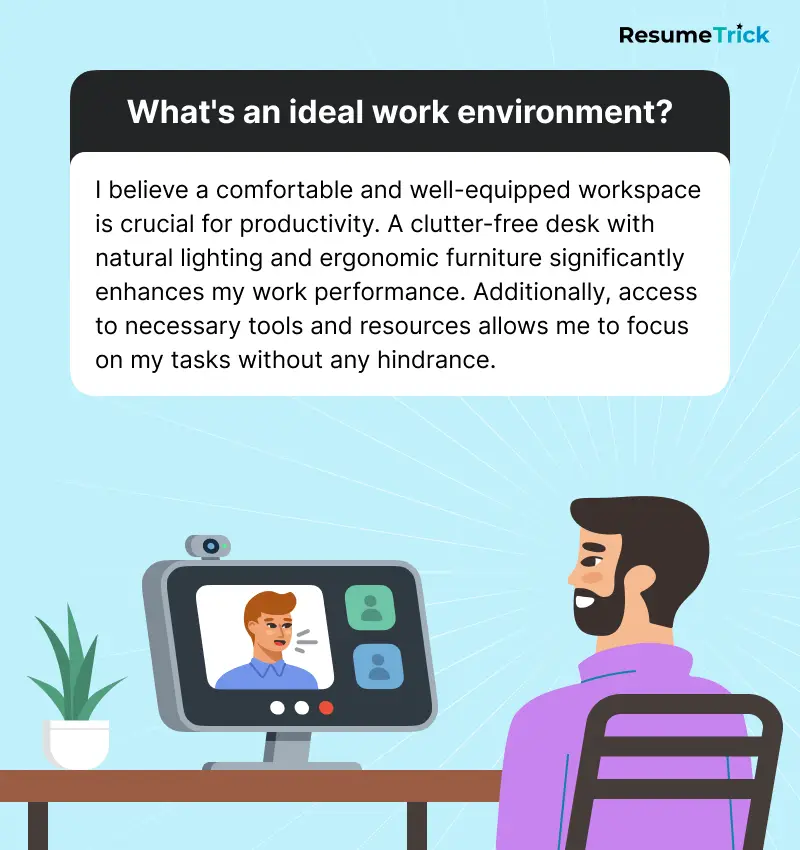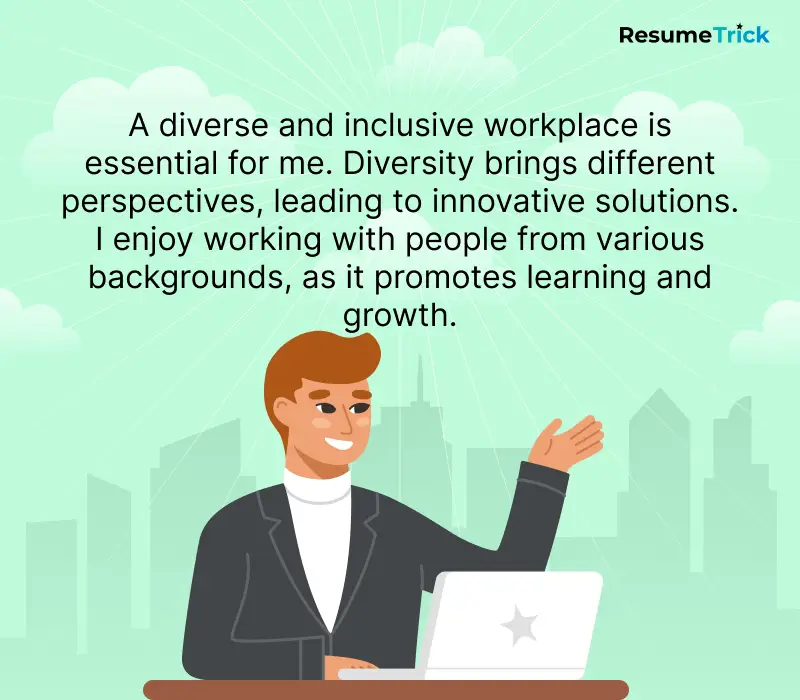Navigating the job market and securing a position that aligns with your values and preferences often hinges on articulating your ideal work environment.
This article explores the multifaceted nature of ideal working conditions and offers strategic insights on how to effectively convey your interests during an interview.
By understanding both your personal needs and the attributes of successful workplaces, you can craft a compelling narrative that positions you as a candidate who will thrive in the role and contribute positively to the team.
I believe that working with good people matters because then the work environment is good. If there is a sense of respect and belief among the people you work with, that is when good work is done.
What is an ideal work environment?
An ideal job environment is a setting where employees feel motivated, valued, and capable of performing at their best. It is characterized by several key elements that collectively create a positive and productive atmosphere.
Now let's explore the main components of an ideal work environment.
1. Supportive Culture
Culture is to recruiting as product is to marketing.
A supportive culture is one in which personnel feel valued, respected, and encouraged to do their best. Such atmosphere fosters a sense of community and belonging.
Ideal work culture means:
- Employees are aided to share their thoughts, ideas, and concerns without fear of judgment or retribution.
- Regularly acknowledging and rewarding crew for their hard work and achievements.
- A commitment to diversity and inclusion ensures that everyone, regardless of their background, feels welcome.
- Leaders and colleagues show empathy and support for each other’s personal and professional challenges.
- Encouraging teamwork and collaboration where jobholders work together to achieve common career goals.
All these points are integral to employee satisfaction and productivity. Such components create an ideal workplace where everyone feels safe, respected, and motivated to maximize their potential.
Example
Monthly open forums where employees can speak directly to management.
2. Physical Comfort
Being a great place to work is the difference between being a good company and a great one.
Physical comfort refers to the conditions and elements that contribute to a perfect work environment.
This includes providing ergonomic furniture, such as adjustable chairs and desks, which support proper posture and reduce strain. The workspace layout should be spacious and well-organized to facilitate easy movement and access to tools.
Lighting, whether natural or artificial, should be sufficient and balanced to minimize glare and reduce eyestrain.
Temperature control and good ventilation are crucial factors in maintaining a comfortable atmosphere that supports productivity.
Minimizing noise distractions through soundproofing and designated quiet areas helps employees maintain focus and concentration.
Regular cleaning and maintenance of work spaces and facilities ensure cleanliness and functionality, contributing to a pleasant office environment.
Overall, a well-designed and comfortable physical environment plays a significant role in enhancing job satisfaction. It supports employees in performing their tasks effectively and contributes to a positive workplace culture.
Example
Providing standing desks and noise-cancelling headphones to employees who work in open-plan offices.
3. Work-Life Balance
Hire great people and give them the freedom to be awesome.
Work-life balance is the equilibrium that individuals strive to achieve between their professional responsibilities and their personal lives. It requires effective management of work demands - whether from their career, job, or organization - and private activities, relationships, and leisure pursuits.
Supportive employers foster work-life balance through policies such as parental leave, wellness programs, and a culture that values the connection between job and home.
Example
Offering flexible remote work options and mental health days to employees.
4. Opportunities for Growth
It’s about getting the best people, retaining them, nurturing a creative environment & helping to find a way to innovate.
These opportunities refer to the avenues available within a company that enables employees to enhance their skills, knowledge, and career prospects. These factors are essential for professional development and creates an ideal working environment.
Key aspects include:
- Training and Programs. Organizations offer various workshops and courses to help employees stay updated with industry trends.
- Career Advancement. Clear pathways for career progression through promotions and job rotations.
- Mentorship. Programs that pair staff with experienced coaches who provide guidance, advice, and support.
- Feedback. Regular performance evaluations that give insights into strengths, areas for improvement, and career development opportunities.
- Networking Opportunities. Events, forums, and sessions that allow associates to build relationships and expand their professional network.
Example
Company-sponsored attendance to industry conferences.
5. Job Security
Transparency starts as a mindset change.
Job security is the feeling that employees can keep their current jobs without fear of being laid off or terminated unexpectedly.
This includes:
- Transparent communication about job expectations, performance evaluations, and the criteria for job retention.
- Employment policies that protect personnel from arbitrary dismissal and provide avenues for resolving disputes or grievances.
Example
Clear HR procedures for conflict resolution and appeals.
6. Fair Compensation
There’s no magic formula for great company culture. The key is just to treat your staff how you would like to be treated.
Fair compensation refers to the remuneration and benefits employees receive in exchange for their work. This can be wages that are competitive within the sphere and region, comprehensive packages, bonuses, incentives, or merit-based pay increases.
Example
Offering performance-based bonuses alongside a comprehensive benefits package including health insurance and retirement plans.
What is your ideal work environment?
When answering the interview question "What is your ideal workplace?", it's important to provide a response that reflects your genuine interests while aligning with the company's work culture.
How to craft an effective answer:
- Before the interview, research the company's culture, values, and work environment. Look at their website, employee reviews, and any available information about their workplace practices.
- Reflect on what truly makes you thrive at work. Consider factors such as management style, team collaboration, physical workspace, work-life balance, and opportunities for growth.
- Tailor your answer to highlight how your ideal working conditions match the company’s actual environment. Mention specific aspects that you find appealing.
- While it's valuable to be specific about your preferences, it's also wise to show that you're adaptable and can thrive in diverse contexts.
Here’s a structured way to frame your answer:
- Start with General Preferences. Begin by describing the overall characteristics that you value in an ideal office environment.
- Mention Examples. Give concrete examples of what these conditions look like in practice.
- Connect to the Employer. Relate your interests with what you know about the employer's workplace.
What is your ideal work environment sample answers
Please, describe your ideal work environment.
"I thrive in a supportive job environment where there is a strong emphasis on professional growth. I appreciate a workplace that offers continuous learning opportunities, such as training programs, mentoring, and clear career paths. For instance, I was part of a mentorship program that was instrumental in advancing my skills and career. From my research, I understand that BinCo prioritizes employee development and maintains a transparent culture, which is exactly what I am looking for."

What type of environment do you work best in?
"I am attracted to a technologically advanced work setting that embraces innovation. I enjoy utilizing the latest tools and software to increase efficiency and productivity. I've read that your company is at the forefront of technological innovation in your industry. This makes it an ideal working environment for me to contribute my skills and continue to learn."

How would you describe your ideal work environment?
"I excel in a fast-paced, energetic work environment where there is always something new and challenging to tackle. I enjoy the excitement and dynamism of working on multiple projects simultaneously and meeting tight deadlines. From what I've learned, FortisCorp operates in a rapidly evolving industry, and the high-energy environment you provide is a perfect fit for me."

What does your ideal work environment look like?
"My dream setting is one that offers flexibility and promotes a healthy work-life balance. I perform at my best when I have the autonomy to manage my schedule and work in a way that's right for me, whether that's through flexible hours or the ability to act remotely. I also value a workplace that respects and supports the well-being of its employees, as your company does."
.webp)
What kind of environment do you thrive in?
"My preferred work environment is the one that is structured and goal-oriented. I thrive in settings where there are clear objectives, well-defined roles, and efficient processes in place. I appreciate having set deadlines and measurable goals that help me stay focused and productive. For example, we used project management tools that kept everyone on track and ensured accountability."
FAQ
- Is remote work considered part of ideal work environment?
- For some individuals, remote work has become an integral aspect of a professional environment. It allows for flexibility and can improve lifestyle equilibrium, but it may not be suitable for all job roles.
- What is the impact of managers on fostering a conducive workplace?
- Managers play a critical role by providing effective leadership, promoting open communication, and setting clear expectations for their team members. Senior colleagues should also be approachable and available to address any concerns that may arise.
- Does regular team-building activities contribute to an ideal workplace?
- Yes, they can help foster a sense of camaraderie and boost morale among laborers. While they might not be essential, they can definitely aid in fostering a positive and unified work atmosphere.
- What can employees do to improve the work environment?
- Workers can enhance the job environment by being proactive, communicating openly with their peers and managers, and participating in activities. Additionally, providing constructive feedback and suggestions for improvement can also help create a positive work environment for all.
Conclusion
Satisfied employees mean satisfied customers, which leads to profitability.
In summary, recognizing and defining your ideal work environment is crucial for achieving both job satisfaction and professional success. By understanding the conditions that help you perform your best, you can more effectively assess potential employers and find a mutually beneficial fit.
Ultimately, understanding your perfect job environment and confidently conveying it during interviews enables you to make informed career decisions. This approach helps you secure a position that matches your needs and strengths, leading to a more fulfilling and productive work experience.
Create your professional Resume in 10 minutes for FREE
Build My Resume






